Scotland’s Essential Sector
Priorities for the next Scottish Government
SCVO’s 2026 Scottish Parliament election manifesto
A call to action
Voluntary organisations are at the heart of Scotland’s response to the biggest challenges we face — tackling poverty, improving health and wellbeing, supporting children and families, strengthening local economies, advancing climate action, building skills for the future, and much more besides.
From mental health support to employability programmes, from sports clubs to social care, from community transport to creative arts — voluntary organisations deliver vital support to people and communities in every part of Scotland.
They are trusted, rooted in communities, and are at the heart of a healthy society, a fair economy, and a strong democracy.
They are Scotland’s Essential Sector.
As we look ahead to the next Scottish Parliament elections, one thing is clear: government cannot meet the needs of people and communities alone. The next Scottish Government needs a strong, sustainable voluntary sector.
This manifesto outlines what the sector needs to make that a reality. These priorities have been shaped by the sector itself — through deep engagement and honest conversations about what’s working, what’s not, and what needs to change.
This is a call to action for the next Scottish Government to work with us — to build a fairer, stronger Scotland, together.

Anna Fowlie
Chief Executive, SCVO




Scotland's voluntary sector in numbers
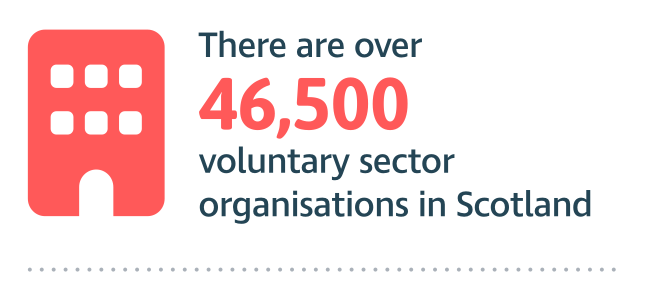
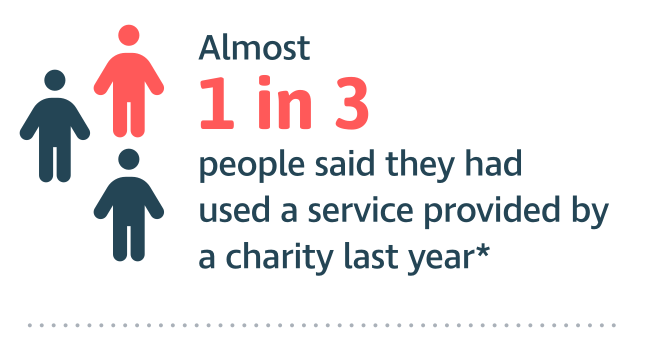
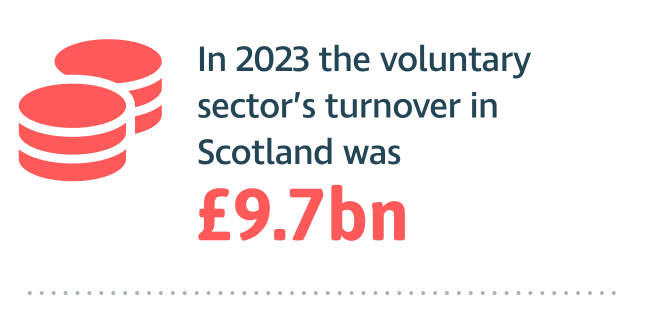
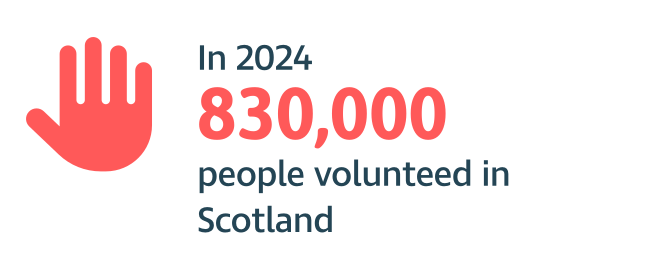
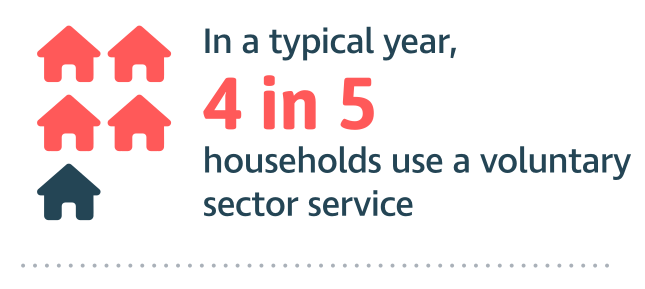
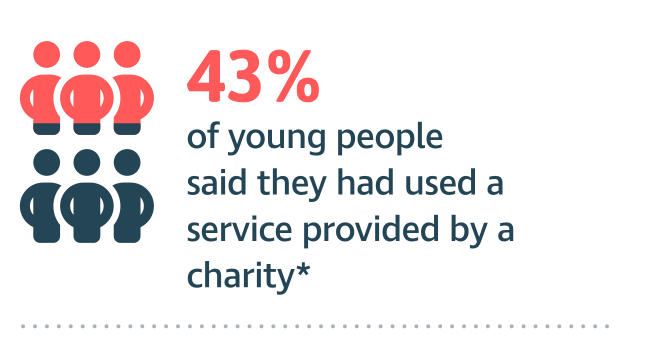
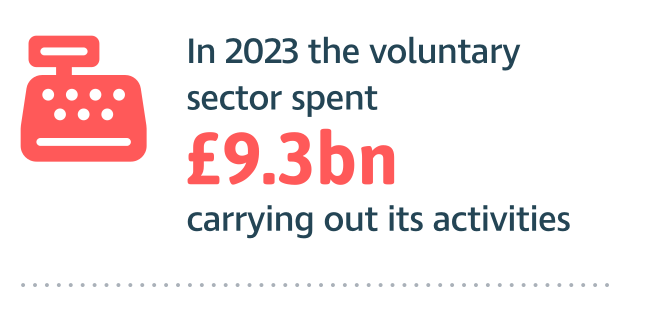
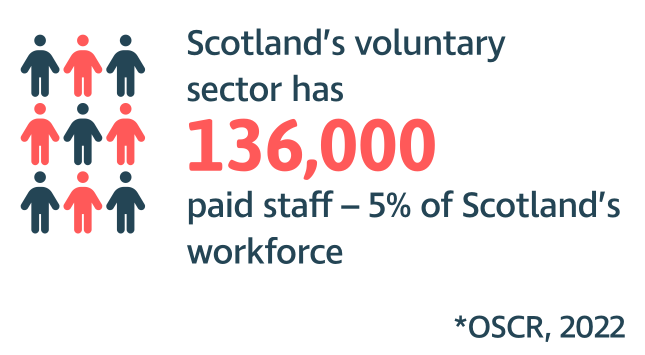



Priorities for the next Scottish Government
Deliver Fair Funding
SCVO works with voluntary organisations to understand the funding challenges they face, and to develop the solutions that they need. Evidence from our engagement — backed by the findings of the Scottish Third Sector Tracker — shows that the need to reform the public sector funding landscape for voluntary organisations has never been more pressing.
Too often and for too long voluntary organisations, providing vital services to people and communities across Scotland, are treated as the poor relation to mainstream public services. They have had to contend with budget cuts, short-term funding cycles, late payments, incoherent decision-making, poor communication, inadequate grant management, and more.
This persistent poor practice damages staff morale, negatively affects recruitment and retention of staff and volunteers, creates significant challenges for forward planning, and crucially disrupts service delivery across Scotland.
While successive Scottish Governments have made welcome commitments, they haven’t gone far enough – and progress remains frustratingly slow. The next Scottish Government must do more and move faster.
We are calling for the Scottish Government to embed SCVO’s Fair Funding principles, which include:
- Multi-year funding: funding that provides a minimum three-year standard across all government departments, agencies and public bodies. This must include measuring and reporting on the number of grants and contracts delivered on a multi-year basis.
- Flexible funding: funding that is unrestricted, covers core costs, and enables organisations to plan, adapt, and meet good governance requirements. Funders must build in flexibility in project design, monitoring, and timescales.
- Sustainable funding: funding that includes inflation-based uplifts and full cost recovery — covering core operating costs and the full costs of employing staff, with payment of at least the Real Living Wage and parity with public sector pay, addressing long-standing disparities between the public and voluntary sectors.
- Accessible funding: funding with streamlined, proportionate, and consistent processes for applications, reporting and payment — with timely decisions, clear guidance, and adequate lead-in times.
- Transparent funding: funding that enables organisations and the public to understand, participate in, and scrutinise funding decisions — with clear delivery goals, timelines, and accountability mechanisms to track progress on Fair Funding across government.
By embedding SCVO’s Fair Funding principles across its own departments, agencies, and bodies, the Scottish Government can set a clear example for the whole public sector to follow.
Create a partnership of equals
A successful, equitable partnership between the voluntary and public sectors is vital to achieving the best outcomes for people and communities.
Too often, however, public bodies overlook the voluntary sector in planning, decision-making and delivery. That must change.
We need the right infrastructure to enable a genuine partnership between the voluntary sector and public bodies in Scotland.
Across the UK, governments have developed formalised models of partnership between the voluntary sector and government. In Wales, the Third Sector Scheme is set in statute. In Northern Ireland a new partnership agreement between the government and the voluntary sector has recently been published. The UK Government has launched its own model of collaboration — the Civil Society Covenant.
Learning from these models — what worked well, and what could be done better — the next Scottish Government can take a bold, first step by establishing a formal partnership between the voluntary and public sectors. This would lay the groundwork for a new relationship, of equals, between the voluntary sector and the wider public sector — one that is consistent, accountable, and embedded across all levels of government.
We’re calling for the next Scottish Government, its agencies and bodies, to commit to a new, formalised relationship with the voluntary sector — one that is:
- Underpinned in statute, and aligned with relevant legislation, strategies and action plans, to ensure consistency and longevity across government departments, agencies and public bodies.
- Accountable for delivery across all public bodies, ensuring that commitments made by the Scottish Government to the voluntary sector are consistently implemented at every level, with clear structures in place to monitor progress, share good practice and ensure follow-through.
- Outcomes-focused, with shared goals that prioritise people and communities.
- Protective of the sector’s independence, recognising its unique role, expertise and voice.
- Aligned with Fair Funding principles, by embedding transparent and sustainable funding practices across all public bodies.
Commission with communities
Commissioning is how public bodies plan and buy services to meet community needs. In Scotland, the system must work better — not just for voluntary organisations but for the people and communities they serve.
Too often, public bodies default to procurement, creating rigid, complex processes that are disproportionately bureaucratic. This can exclude smaller, specialist organisations, with insufficient emphasis on quality, impact, and community need. This means communities lose out on the ingenuity, experience, and reach of voluntary organisations — a missed opportunity Scotland cannot afford.
While SCVO welcomes the reforms the Scottish Government has put in place to date, and the steps taken to continually improve its own approach to commissioning and procurement, there is much still to do.
SCVO is calling on the Scottish Government to show leadership, by continuing to embed ethical commissioning practice across its own departments, agencies, and bodies, setting a clear example for others to follow.
The next Scottish Government must commit to:
- Application of Fair Funding principles to all contracts — including flexible, sustainable, accessible, and transparent funding, with a presumption in favour of multi-year commitments as standard practice.
- Adoption of a collaborative commissioning approach, designing funding and commissioning processes that encourage joint working across sectors, rather than defaulting to competitive tendering, where possible. The planning, design and delivery of services must bring together people, communities and providers.
- Simplification of processes, reducing complexity in commissioning and tendering processes for small and specialist organisations, while avoiding applying procurement approaches to grant-making.
- Improving understanding of the voluntary sector within public bodies.
- Ending the default to procurement within public bodies, recognising that commissioning should be flexible and proportionate, and that formal procurement is not always the most appropriate route.
- Consistency of good practice across public bodies, ensuring that commissioning and procurement is guided by shared principles, and not a patchwork of different systems and expectations.
- Investment in training and development for both voluntary organisations and public sector commissioners.
- Use of lotting, breaking large contracts into smaller, more manageable parts to enable participation by smaller, expert organisations.
These changes, if rolled out across the public sector, will help to deliver better outcomes for communities and unlock the full potential of Scotland’s voluntary sector.
Find out more about our work on commissioning and procurement
Modernise regulation
Effective regulation builds public trust, supports sustainability, and ensures a fair operating environment for voluntary organisations.
We work across the voluntary sector and beyond to ensure that regulation-related decisions are made by taking the sector's circumstances, views and concerns into account.
SCVO welcomes that the current Scottish Government has committed to a wide-ranging review of charity law, expected to begin in the next parliamentary term.
Whichever party forms the next Scottish Government, the voluntary sector is clear that it wants to see a comprehensive, holistic, and independent review of the regulatory landscape covering the charitable sector, with an extensive scope informed by voluntary organisations.
Secure the future of volunteering
Volunteering is vital to Scotland’s communities, economy, wellbeing, and underpins the success of the voluntary sector itself. From running community groups to national charities, volunteers make an essential contribution across Scotland every day.
In 2023 alone, around 18 per cent of Scottish adults — approximately 830,000 people — volunteered with a group or organisation. Volunteer Scotland has estimated that £2.3 billion of social and economic value is contributed to the Scottish economy through volunteering.
Despite the benefits of volunteering – for the individual, for society, and for our economy – participation has steadily declined over the long term, and more rapidly in recent years. The Third Sector Tracker shows that volunteer recruitment and retention remains one of the most pressing challenges that voluntary organisations continue to face.
Voluntary organisations have also told us of the difficulties they’ve faced recruiting people to join boards. Trustees of charities and other voluntary organisations are volunteers, yet they have complex governance and legal responsibilities. There needs to be work across a range of partners, including Scottish Government, to promote the benefits of being a trustee.
We support Volunteer Scotland’s call for action, and identified policy priorities, to reverse the decline in volunteer participation and ensure that everyone can access meaningful, supported volunteering opportunities. These include Fair Funding, retention of the Protection of Vulnerable Groups Scheme fee waiver, and investment in the implementation of the Volunteering Action Plan.
Protect the voluntary sector’s voice
From small community organisations to larger organisations with a campaigning focus, voluntary organisations across Scotland advocate for social justice, amplify marginalised voices, and hold the powerful to account.
This important role is increasingly under threat from legal actions designed to intimidate and silence those speaking out on matters of public interest, also known as Strategic Lawsuits Against Public Participation (SLAPPs).
SCVO’s engagement with voluntary organisations shows that even the threat of such legal tactics undermines day-to-day work and discourages organisations from making their voice heard — with real consequences for the people and communities they support.
We welcome that the current Scottish Government is exploring this issue, including a consultation on steps that could be taken. The next Scottish Government must build on this work, ensuring robust protections are in place to safeguard public participation and advocacy.
We are calling for the next Scottish Government to put in place:
- Anti-SLAPP legislation that prevents the misuse of legal processes to silence public interest advocacy.
- Clear protections for voluntary organisations and campaigners engaging in lawful advocacy.
- Support and guidance to help organisations understand and respond to SLAPP threats.
SCVO’s response to the Scottish Government’s consultation on SLAPPs



About this manifesto
To deliver the best possible outcomes for people and communities across Scotland, the Scottish Government needs a voluntary sector that is sustainable and resilient.
These asks reflect the real experiences, challenges, and ambitions of people and organisations working every day to support people and communities across Scotland.
This manifesto is shaped by the collective voice of Scotland’s voluntary sector. SCVO’s policy positions and proposals have been developed over several years through extensive engagement with organisations of all sizes and across all parts of the country.
This includes evidence from the Third Sector Tracker, which provides regular, up-to-date insights into the new and ongoing challenges facing the sector.
More recently, SCVO led a dedicated policy development process focused on the 2026 Scottish Parliament election. This process combined survey work with direct engagement with voluntary organisations.

